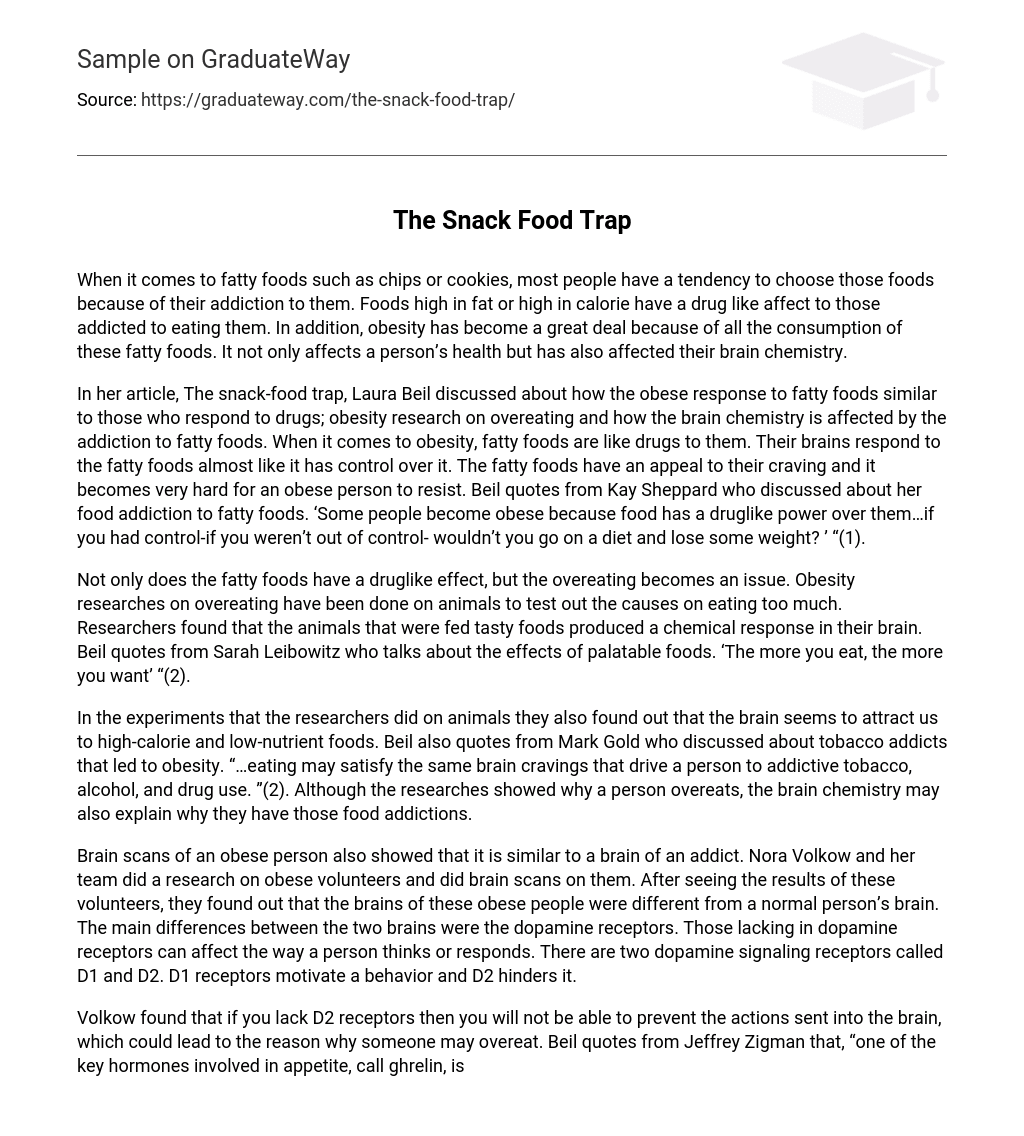When it comes to fatty foods such as chips or cookies, most people have a tendency to choose those foods because of their addiction to them. Foods high in fat or high in calorie have a drug like affect to those addicted to eating them. In addition, obesity has become a great deal because of all the consumption of these fatty foods. It not only affects a person’s health but has also affected their brain chemistry.
In her article, The snack-food trap, Laura Beil discussed about how the obese response to fatty foods similar to those who respond to drugs; obesity research on overeating and how the brain chemistry is affected by the addiction to fatty foods. When it comes to obesity, fatty foods are like drugs to them. Their brains respond to the fatty foods almost like it has control over it. The fatty foods have an appeal to their craving and it becomes very hard for an obese person to resist. Beil quotes from Kay Sheppard who discussed about her food addiction to fatty foods. ‘Some people become obese because food has a druglike power over them…if you had control-if you weren’t out of control- wouldn’t you go on a diet and lose some weight? ’ “(1).
Not only does the fatty foods have a druglike effect, but the overeating becomes an issue. Obesity researches on overeating have been done on animals to test out the causes on eating too much. Researchers found that the animals that were fed tasty foods produced a chemical response in their brain. Beil quotes from Sarah Leibowitz who talks about the effects of palatable foods. ‘The more you eat, the more you want’ “(2).
In the experiments that the researchers did on animals they also found out that the brain seems to attract us to high-calorie and low-nutrient foods. Beil also quotes from Mark Gold who discussed about tobacco addicts that led to obesity. “…eating may satisfy the same brain cravings that drive a person to addictive tobacco, alcohol, and drug use. ”(2). Although the researches showed why a person overeats, the brain chemistry may also explain why they have those food addictions.
Brain scans of an obese person also showed that it is similar to a brain of an addict. Nora Volkow and her team did a research on obese volunteers and did brain scans on them. After seeing the results of these volunteers, they found out that the brains of these obese people were different from a normal person’s brain. The main differences between the two brains were the dopamine receptors. Those lacking in dopamine receptors can affect the way a person thinks or responds. There are two dopamine signaling receptors called D1 and D2. D1 receptors motivate a behavior and D2 hinders it.
Volkow found that if you lack D2 receptors then you will not be able to prevent the actions sent into the brain, which could lead to the reason why someone may overeat. Beil quotes from Jeffrey Zigman that, “one of the key hormones involved in appetite, call ghrelin, is also involved with the reward system in the brain that drives us to eat”(4). Producing a greater amount of ghrelin can lead to overeating. Food addiction has so much affects to those who consume an excessive amount of them. It also leads to reasons why a person becomes obese and why they overeat.
The fatty foods that an obese person eats become an addiction to them similar to how someone becomes addicted to drugs. They have no control over themselves because it has a druglike power over them. Ingesting these fatty foods also create a chemical that makes you want to continue eating more and more of it, which leads to overeating. While obesity is still being researched, there have been founds that an obese person’s brain actually lacks certain receptors that also comes to show why they eat more than they are supposed to.





